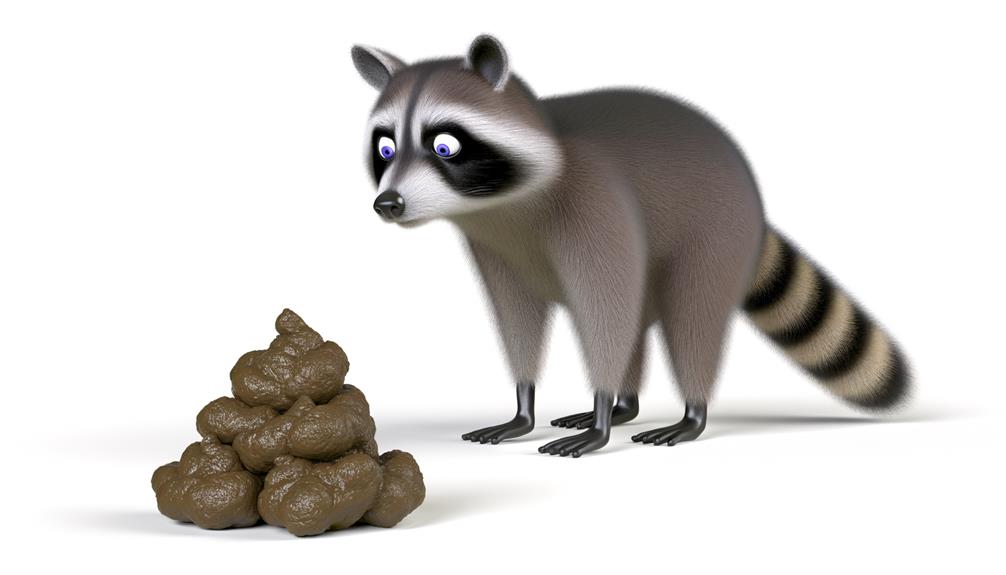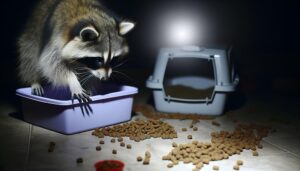Does Dog Poop Deter Raccoons Naturally?
Scientific and anecdotal evidence generally contradict the belief that dog feces effectively deter raccoons. As intelligent, adaptable omnivores with a keen olfactory sense, raccoons display limited aversion to dog feces.
Although the presence of canine feces could potentially signal a threat, their intrinsic fear is not robustly triggered by this marker alone. Factors such as placement and inherent raccoon behavior influence any mild deterrent effect observed in isolated instances.
The use of this method also entails health and environmental risks. Nonetheless, a nuanced understanding of raccoon behavior might yield more effective deterrence strategies.

Key Takeaways
- Raccoons' behavior and sensory perception might make them averse to predator scents, such as dog feces.
- The effectiveness of using dog poop as a deterrent is not guaranteed and varies based on different factors.
- There are potential risks in using dog feces as a deterrent, including harmful pathogens and environmental impacts.
- Alternatives to using dog feces include motion-activated sprinklers, ultrasonic repellents, and ammonia-soaked rags.
- Scientific evidence suggests that dog feces have minimal effectiveness in deterring raccoons, with inconsistent results observed.
Understanding Raccoon Behavior
To effectively deter raccoons with dog poop, it is essential to comprehend the inherent behaviors and traits that characterize these nocturnal creatures. Primarily omnivorous, raccoons exhibit a remarkable adaptability to diverse food sources, which often leads them to human habitats in search of sustenance.
They are characterized by their dexterous forepaws, enabling them to open containers and gain access to food sources. Moreover, their acute sense of smell aids in their foraging habits, which is relevant when considering dog feces as a deterrent. Raccoons exhibit neophobia, an aversion to new objects or changes in their environment. Utilizing such information about their behavioral patterns could potentially aid in devising strategies to deter them.
However, the effectiveness of dog poop as a deterrent will be examined in the ensuing subtopic.
The Dog Poop Deterrent Theory
While it may seem unconventional, the theory of using dog feces as a deterrent against raccoons is rooted in the animals' behavioral tendencies and sensory perceptions.
The main premise of this theory is based on the idea that raccoons, being cautious and intelligent creatures, are deterred by the scent of predators, including dogs. Consequently, strategically placing dog feces in potential raccoon-infested areas may act as a natural barrier, discouraging their intrusion.
It is important to note, however, that this deterrent theory is not universally accepted. Critics argue that the effectiveness is dependent on various factors such as the raccoon's familiarity with dogs, its level of desperation for food, and the availability of alternate routes.
Hence, while intriguing, the dog poop deterrent theory warrants further investigation.
Scientific Basis Behind the Method
The method of using canine feces as a raccoon deterrent stems from the understanding of how olfactory stimuli influence raccoon behavior.
The scent of a potential predator, such as a dog, in their territory can trigger a fear response in raccoons, discouraging them from approaching.
This forms the foundation of the scientific rationale behind the use of dog feces as a deterrent, a subject we will explore further in this section.
Odor Influence on Raccoons
Remarkably, scientific studies have shown that raccoons, possessing an extraordinary sense of smell, demonstrate strong aversion to certain odors, such as that of dog feces. This olfactory sensitivity surpasses even that of humans, allowing them to detect and differentiate a vast array of scents.
Research indicates that raccoons' aversion stems from their instinctual need to avoid potential predators, which, in their ecological context, includes dogs. This instinctive behavior is evident even in urban settings where their natural predators are scarce.
Although dog feces specifically may not be the primary deterrent, it is the associated odor of a potential predator that triggers their avoidance behavior. Therefore, the odor, rather than the physical presence of the feces, is the key factor deterring raccoons.
Canine Feces: Raccoon Repellent?
Given the aforementioned olfactory sensitivity of raccoons and their instinctual aversion to the scent of dog feces due to its association with potential predators, it is plausible to contemplate canine feces as a possible raccoon repellent. Initial studies indicate that the strong, unique aroma of canine excrement may function as a deterrent, capitalizing on raccoons' sensitive olfactory system.
However, the effectiveness of this method is contingent upon several variables, including the raccoon's previous encounters with dogs, and the strength and freshness of the fecal odor. Additionally, other potential food sources may override a raccoon's aversion. Hence, while dog feces may deter some raccoons under certain circumstances, it is not a universally effective repellent.
Further research is required to establish its reliability as a raccoon deterrent.
Insights From Wildlife Experts
Drawing from their extensive knowledge and experience, wildlife experts provide fascinating insights into the efficacy of using dog feces as a deterrent for raccoons. They explain that the presence of canine feces may signal the territory of a larger predator, thereby potentially discouraging raccoons from venturing into the area.
However, this deterrent effect is not guaranteed. Factors such as the raccoon's hunger level, previous experiences, and the relative scarcity of food sources can greatly influence their response. In addition, not all raccoons exhibit the same behavior patterns, and some may even be emboldened by the challenge.
Risks and Concerns of Using Dog Poop
While dog feces may deter raccoons, it is crucial to weigh the potential health risks and environmental impacts associated with its use.
The feces may contain harmful pathogens, posing a direct threat to human and animal health.
Additionally, the environmental implications of dog poop, as well as its potential attractiveness to other pests, warrant thorough examination.
Health Hazards of Poop
Despite the potential usefulness of dog feces in deterring raccoons, it is essential to understand the potential health risks and concerns associated with this practice.
Dog poop can harbor disease-causing bacteria and parasites such as E. coli, Salmonella, Giardia, and roundworms, which can infect humans and other pets. Direct contact or inadvertent ingestion of contaminated soil or water can result in severe gastrointestinal distress, and in some cases, more serious conditions like kidney disorders. Children, the elderly, and those with weakened immune systems are at particularly high risk.
Additionally, improper handling or disposal of dog feces can facilitate the spread of these pathogens. As a result, despite its potential benefits, the use of dog poop as a raccoon deterrent should be approached with caution.
Potential Environmental Impact
In addition to health risks, utilizing dog feces as a raccoon deterrent can also pose significant environmental concerns. The presence of dog feces in the environment, particularly in non-biodegradable bags, can contribute to pollution and negatively impact local ecosystems.
Additionally, dog feces can contain pathogens that are harmful to other animals and plants. The feces may also contaminate water sources, leading to the spread of diseases. Besides, if the feces are not disposed of properly, they can attract other pests which then exacerbate the problem.
Hence, while the idea of using dog poop as a raccoon deterrent might seem appealing, the potential environmental impact should be carefully considered to safeguard our natural ecosystems.
Dog Poop Attractiveness Factor
Considering the use of dog feces as a raccoon deterrent, it is essential to understand its potential attractiveness to other wildlife, potentially worsening the pest problem. Canine excrement contains organic matter and nutrients that can attract various species, such as rodents or insects, increasing the biodiversity of pests in your area.
Although it may deter raccoons, it can create a breeding ground for parasites and diseases, posing a health risk to pets and humans. Moreover, dog feces decay contributes to unpleasant odors, attracting scavengers like flies.
These concerns underscore the need for thorough pest control strategies that consider ecological balance and public health, rather than relying solely on deterrents like dog feces.
Alternative Raccoon Deterrents
Turning our attention away from canine feces, we now explore alternative deterrents that can also effectively discourage raccoon presence and activity.
Motion-activated Sprinklers: These devices, armed with infrared sensors, can detect the presence of raccoons, and release a sudden burst of water, creating an environment that is inhospitable and startling to the intruders.
Ultrasonic Repellents: These produce high-pitched sounds, undetectable to human ears, but distressing to raccoons. This discomfort can deter them from entering or lingering in the area.
Ammonia-soaked Rags: Raccoons dislike the strong smell of ammonia. Strategically placing these rags can create a scent barrier, exploiting the raccoon's acute sense of smell to keep them away.
These methods respect the freedom of the raccoons while maintaining the sanctity of your space.
Case Studies: Dog Poop Vs Raccoons
Having explored alternative deterrents for raccoons, it is pertinent to examine the efficacy of dog feces as a raccoon deterrent through a series of case studies.
In one study, no significant aversion was observed in raccoons exposed to areas marked by dog feces, suggesting limited deterrent effect.
Another study observed a mild deterrence effect, but concluded it to be inconsistent and highly dependent on individual raccoon behavior.
These findings were further substantiated by a third study, which found that raccoons demonstrated no clear aversion to dog feces in controlled conditions.
It is thus reasonable to conclude that, based on the available scientific evidence, the effectiveness of dog feces as a reliable raccoon deterrent appears to be minimal.
Conclusion
To wrap up, the theory that dog excrement functions as a raccoon deterrent lacks solid scientific backing. Despite anecdotal evidence, wildlife experts emphasize the risks and potential harm linked to this method.
As a result, the utilization of dog waste as a raccoon deterrent mirrors a placebo effect; it provides a false sense of security while neglecting the actual issue.
It is recommended to resort to more effective, humane, and environmentally friendly alternatives for raccoon control.






